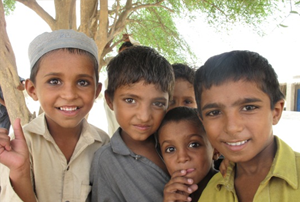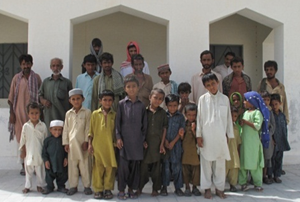Villagers from Khorooro in District Tharparkar at Mithi, Sindh used the advocacy campaign on engagement with the government institutions that lead to opening of their village’s primary school for the first time in six years, after its construction. The residents of Khorooro in the Union Council Sobhiyar, Taluka Deeplo achieved their objective through an application submitted to the local education authorities after they attended Sindh Rural Support Program’s (SRSP) awareness meetings and seminars on citizen engagement. Introduction to the Article 19-A of the Constitution of Pakistan was useful for the residents of the remote village as they found out that free education of children is a fundamental right.

In 2013, residents of Khorooro interacted with teams from Sindh Rural Support Program (SRSP), a registered Hyderabad-based trust, then implementing a grant funded by the United States Agency for International Development (USAID), under the Citizens’ Voice Project – a first of its kind $45 million democracy and government’s initiative by the U.S. in Pakistan. SRSP was working for citizens’ voice for strengthening transparency and accountability mechanisms, holding seminars and awareness workshops at Union Council level along with training local stakeholders in citizen engagement with state institutions.
“We tried the wrong way for more than five, six years; meeting the influential people from ‘tar’ (Thar region), but it did not work,” says Hameed Pasayo, a peasant from the village. “After these NGO [SRSP] people showed us how we ought to make way for solutions to our problems… By submitting collectively signed applications… We got the school opened within two months,” he adds.
Although only 75 kilometers (46 miles) away from the district headquarter Mithi, Village Khorooro is still considered a remote village because of being inaccessible by road. With not much progress in the past few decades, problems such as absence of electricity, lack of proper education, health services, water scarcity, and oft-revisiting desert drought push the poor villagers further into misery. Even in these adverse conditions, they consider education to be their top priority.

Through attending the SRSP awareness workshops and seminars and learning how they could effectively engage with the government authorities to solve their problems, villagers prioritized working for a primary school whose building had been provided by a local member of the provincial assembly many years ago. The villagers held a meeting in the village and wrote an application for the opening of the school and got it signed by many other villagers. The application was submitted to the District Education Officer (DEO), Tharparkar at Mithi. Within two months, the authorities appointed a teacher for Khorooro Primary School. Now, the school functions every day, with a total of 45 students from the village, out of which 25 are girls.
Applicants who took the initiative and submitted the application to the DEO’s office were Darya Khan, Ilyas, Nooro Khan, Muhammad Akbar and Muhammad Siddique.
“Previously, we could not send our girls to school as the school was about a mile-long desert hike away,” tells Ali Muhammad, a local parent of a student from the newly-opened school. Muhammad Khan, a local Muslim prayer leader informed about the residents’ intention to get some furniture for the school as part of their collective action to spread education in the village.
Villagers could now send both girls and boys as the school’s location is within their reach and work on its furniture is underway.




















